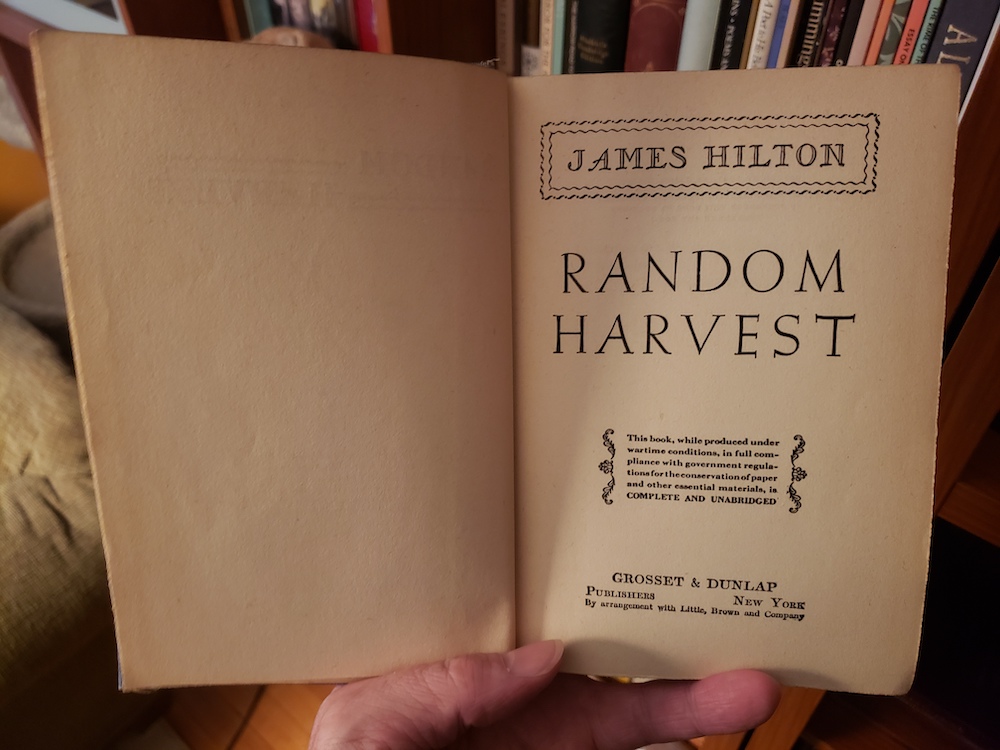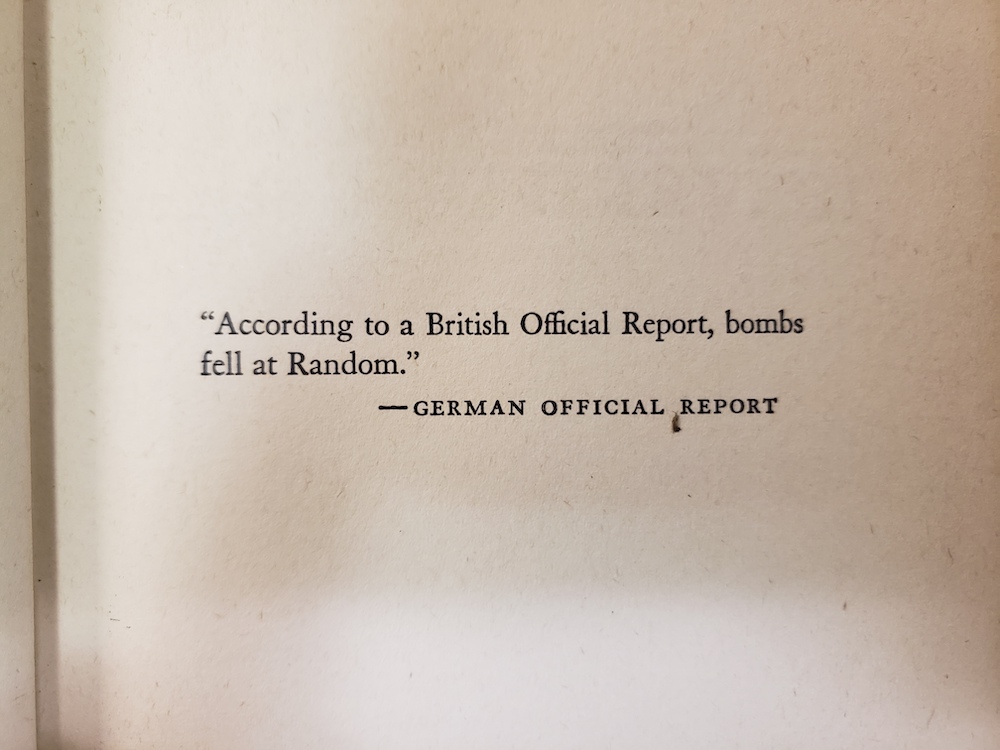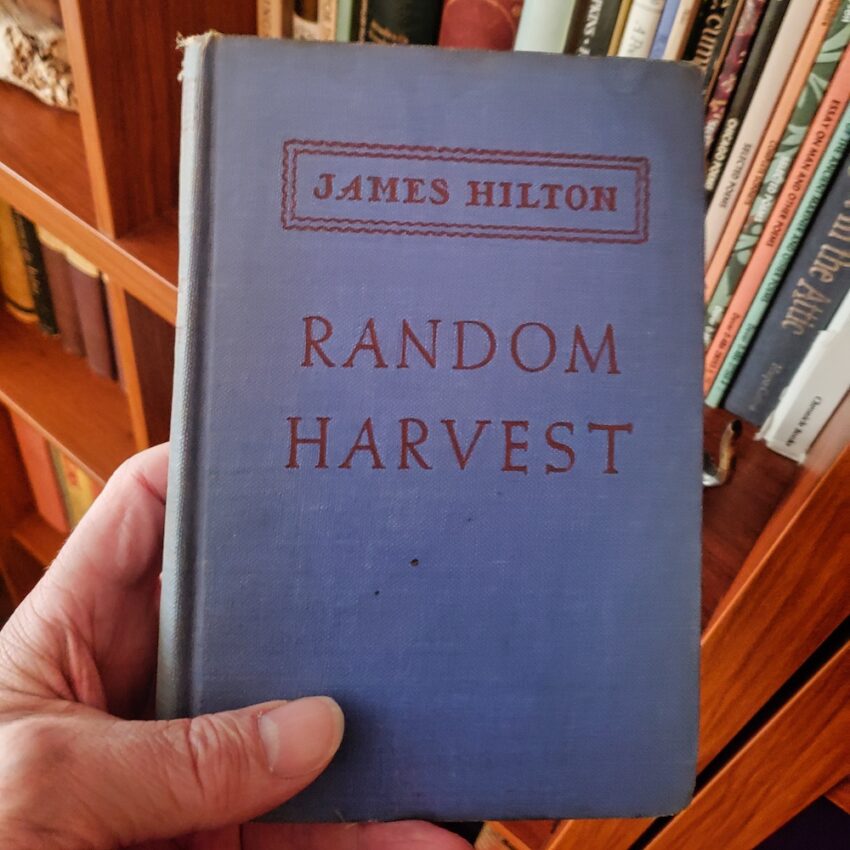While Ruth and I were traveling in 1998, we picked up the habit of reading aloud to each other. The first book with which we started this practice was “Random Harvest,” by James Hilton.
The book was written in 1941, and then turned into a fantastic film version in 1942, starring Ronald Coleman and Greer Garson. It is a moving story of historical fiction about a British WWI vet who has amnesia because of injuries sustained in battle as well as the horrors of that war. The expression “shell-shocked” was born at this time. Relegated to an asylum that is essentially a prison that keeps potentially dangerous former soldiers off the street, the amnesiac played by Ronald Coleman) keeps coming close to remembering his name and past life, but never quite, and in his frustration, he manages to escape the asylum. Dodging into a pub, the man without a name meets a “Paula” (played by Greer Garson) who sympathizes with his plight and senses he is vulnerable rather than dangerous, so she helps him abscond to the countryside. They fall in love and marry, but that is only the beginning of the story. After starting a new career as a journalist, but still absent his long-term memory of who or what he was before the war, the amnesiac is hit by a car one day, and upon waking up remembers his entire previous life, but none of his life since the war!
I will not give away any spoilers, but I want to touch on the impact the book had on me. I am always moved by stories about struggling to understand one’s own identity and wrestling to fit in or to stand out in one’s context, to flow with or to push against the currents swirling around us. It is worth meditating on the significance of those themes during the writing of this book (1941) and the making of the film (1942) which both occurred during the context of WWII (1939-1945). Hilton was born in 1900, and was a teenager during WWI (1914-1918), so he would have been old enough to have understood the horrors of that conflict. How was Hilton influenced by the return to war in Europe? And how would the book and film have impacted people reading or watching the film in the context of a second world war unfolding around them?
I happen to have a first US edition of this novel published and printed in the US in 1941. Two things speak to this line of questioning. First, the title page of the book (pictured below) has bracketed text that draws out the WWII context. The text reads:
“This book, while produced under wartime conditions, in full compliance with government regulations for the conservation of paper and other essential materials, is COMPLETE AND UNABRIDGED.”
Second, on an otherwise blank page before chapter 1, there is an epigraph that reads:
“According to a British Official Report, bombs fell at Random.” —German Official Report
That quote purports to be from the battlefield trenches of WWI, and sets the table for the story by hinting at the trauma of “shell-shock” experienced by the protagonist. But consider also that London, where the author was living and writing this story in 1941, was bombed by Germany from September 1940 through May 1941! Hilton was writing while bombs fell at random. No wonder he was able to do such an outstanding job of seriously exploring all of these themes and questions, even though it was a novel written for popular consumption. I think it is clear that this is not merely a feel-good story, and yet the novel does end on a hopeful note. Like the poppy flowers that sprung up on the trench scarred battlefields of WWI, beauty does emerge from the ashes of the main character’s suffering.
These themes of disorientation, suffering, evil forces in the world and enemies surrounding on every side, and hope for a harvest of healing in spite of all of it, are themes that are expressed powerfully in the Book of Isaiah:
Isaiah 61:1-2, 11 “1 The Spirit of the Lord GOD is upon me, because the LORD has anointed me to bring good news to the poor; he has sent me to bind up the brokenhearted, to proclaim liberty to the captives, and the opening of the prison to those who are bound; 2 to proclaim the year of the LORD’S favor, and the day of vengeance of our God; to comfort all who mourn … 11 For as the earth brings forth its sprouts, and as a garden causes what is sown in it to sprout up, so the Lord GOD will cause righteousness and praise to sprout up before all the nations.”
Jesus himself quoted this passage one day while visiting a synagogue, presenting Himself as the One who will bring this promised hope of healing and restoration!
Luke 4:16-22 16 And he came to Nazareth, where he had been brought up. And as was his custom, he went to the synagogue on the Sabbath day, and he stood up to read. 17 And the scroll of the prophet Isaiah was given to him. He unrolled the scroll and found the place where it was written,
18 “The Spirit of the Lord is upon me,
because he has anointed me
to proclaim good news to the poor.
He has sent me to proclaim liberty to the captives
and recovering of sight to the blind,
to set at liberty those who are oppressed,
19 to proclaim the year of the Lord’s favor.”
20 And he rolled up the scroll and gave it back to the attendant and sat down. And the eyes of all in the synagogue were fixed on him. 21 And he began to say to them, “Today this Scripture has been fulfilled in your hearing.”
For me, a key takeaway from Hilton’s tragic and beautiful novel is that there can be a similar “random harvest” of hope from any crisis and suffering in which we may find ourselves.
Both the book and the film do a wonderful job in exploring these themes and telling this story. I highly recommend both the book and the film to all.
By the way, James Hilton had two other highly regarded novels that were also turned into highly regarded films: Lost Horizon (book 1933, film 1937) also starred Ronald Coleman, but this time with Jane Wyatt (who later stared in the television show “Father Knows Best” opposite Robert Young, and made her final screen appearance in “Star Trek IV: The Voyage Home” in 1986 at age 76).
Hilton’s “Goodbye, Mr. Chips” was published in 1934, and turned into a film twice! In the 1939 version, Robert Donat and Greer Garson starred together, while the 1969 version starred Peter O’Toole (of “Lawrence of Arabia” fame, c. 1962) and Petula Clark (singer of “Downtown” and many other pop hits in the UK and the US). Interestingly, both Robert Donat in 1939, and Peter O’Toole in 1969, won “Best Actor” Oscars for their role in their respective films! Both of these books and their film remakes are also worth reading/watching!




1 thought on ““Random Harvest” Of Hope”
Comments are closed.